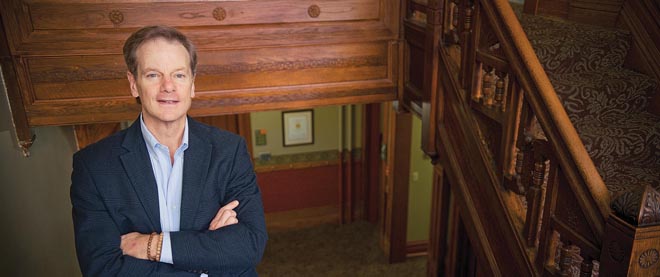An insider’s guide to recovery for addicts and their families
William Moyers was plucked from the point of no return because his family never gave up
Photograph by Ben Garvin
Share

Journalist and former White House press secretary Bill Moyers recalls being “devoured by ignorance” when faced with the reality of his son’s crack and alcohol addiction.
It was 1994, and Bill’s son William, also a journalist, had gone off the rails. His terrified family stormed an Atlanta crack house, not knowing if he were dead or alive, only to find the 35-year-old, wasted, in a closet. “I hate you,” Bill Moyers told his son.
When William finally got clean and sober, he wrote a bestselling memoir, Broken. The media exposure generated endless letters from desperate addicts and family members pleading for advice on where and how to get the kind of help that saved him.
Now What: An Insider’s Guide to Addiction and Recovery is William Moyers’s latest book. “I’ll be candid with you,” he said in an interview last week from St. Paul, Minn., where he lives with his three children. “This is not a profound book in the same way that Broken was, but it’s a practical book, and it should get people to a solution. Not the solution, but a solution.”
William, 53, works for Hazelden, a rehab centre, where he always tells alcoholics it’s okay to ask for help the same way it’s okay to ask for help with a broken leg, because he believes it is a disease. To anyone who doubts that, William always responds: “Don’t take it from me. The American Medical Association defined it as a disease in the 1950s. Take it from the AMA.”
It’s an illness of isolation, and the antidote is to reach out and say, “I need help. Help me.” In the book, he recounts a conversation with a colleague at CNN. “I told him everything about myself, even the two or three secrets I’d sworn I’d never tell anyone. When I did, he leaned back in his chair and said, ‘You too, huh?’ And in that instant, I realized I wasn’t alone in the shame and regret that is so much a force of my illness.”
The Internet makes it easy for people to find support. “There are even impromptu [Alcoholics Anonymous] meetings in airports and on cruise ships,” he writes, “usually heralded over the loudspeaker or by handwritten signs using the code phrase ‘Friend of Bill W.,’ ” a reference to AA’s founding father.
William says interventions should not be harsh, histrionic dramas as seen on TV. “Many people, me included, have been plucked from the point of no return because our families didn’t give up on us and hired a trained, experienced interventionist to get involved.”
Remember that the mind of an addict “hardens into an impregnable defiance,” so an intervention might not work, but that doesn’t mean you should close the door. “Stay in touch and stay connected,” he urges. “You will need to set some terms around illegal or disruptive behaviour, but invite him to dinner, include her in family celebrations, meet him for coffee. At the end of every communication, be sure to ask, ‘Do you want help?’ Regardless of his response, always sign off with, ‘I’m here and I want to help you.’ ”
Don’t wait for the addict to hit rock bottom; start calling professionals and support groups and treatment centres, William advises. “It’s a popular misconception that a sick addict can only quit using and start to get help when he hits rock bottom. The ultimate bottom with addiction is death.”
Then it’s time for family members to take care of themselves. “I always remind families that, when their addict stops using and starts to get well, the family deserves and needs to recover.”
William’s mother, Judith, joined Al-Anon, a support group for the families of addicts, which she continues to attend. “I don’t think it does help me,” William said on the phone, “but it helps her.”
Last week, William visited his father in New York. “You know, I’m proud of you, son,” said the man who once spit out the venomous “hate” word. In the book’s foreword, Bill writes: “Our son says he dedicated his first book, Broken, to his parents because we were with him ‘every step of the way.’ Ha! He was too drunk and drugged to see how many times his father stumbled. It seemed to me that every time I put my foot down, I stumbled.”